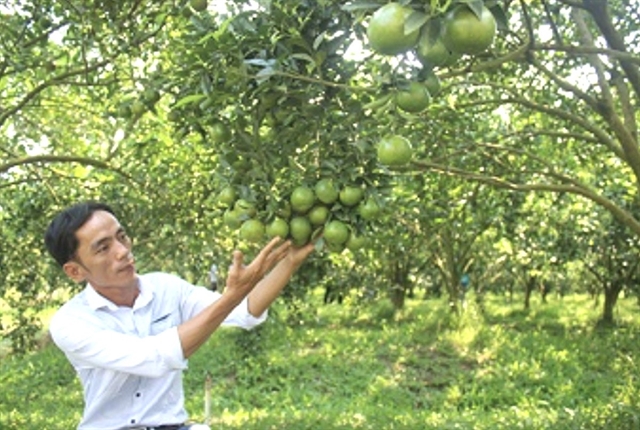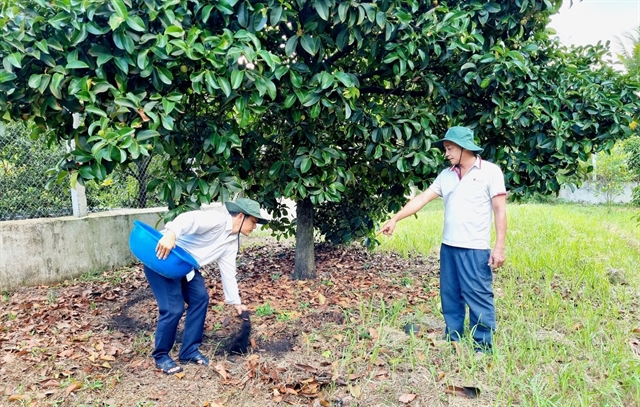
|
| A sweet mandarin orchard in Đồng Nai Province’s Vĩnh Cửu District is planted under organic farming methods. — VNA/VNS Photo Tâm Việt |
ĐỒNG NAI — Đồng Nai Province is expanding the development of organic agriculture to meet market requirements and improve product value.
The southeast province has advantages for developing agricultural production as it has more than 270,000ha of farmland and diversified plants and animals.
It has identified the development of organic agriculture, in combination with processing and outlet for agricultural produce, as one of its four breakthrough missions in 2021-25.
It has implemented projects and programmes of developing organic agriculture to increase organic farming areas and diversify organic produce.
It has advocated developing organic farming for orchards, vegetables and other crops, and taught organic farming methods to farmers.
Trảng Bom District has successfully established exemplary organic orchards and encouraged farmers to develop more such orchards.
Nguyễn Trọng Ý in Đông Hoà Commune was one of the first three farmers in Trảng Bom to develop an exemplary organic orchard for his 17ha of grapefruit.
He plants the fruit under organic farming methods and uses automatic irrigation facilities and organic fertiliser, techniques that help him to reduce production costs by 20 per cent compared to traditional farming methods, he said.
Last year, he earned an income of VNĐ1.2 billion (US$49,600) from the orchard, and many local farmers have visited his orchard to learn the model, he said.
“After applying organic farming, I saw it has many benefits. The first benefit is for the grower, the second benefit is for consumers and the third benefit is the soil of the orchard, as it is not barren and infertile like previously,” he said.
Trần Khắc Dương, Vice Chairman of the Đông Hoà Commune People’s Committee, said: “We will continue developing exemplary orchards in the commune. The commune has some orchards which meet the requirements of exemplary orchards.”
Trảng Bom aims to have at least one exemplary orchard in each commune and town.
The district has issued criteria for developing exemplary orchards such as their scale, application of advanced farming techniques and income.
In Xuân Lộc District, farmers have applied advanced techniques in growing rice and participated in co-operatives to apply mechanisation and produce rice on a large scale.
Many co-operatives in the district have used machines for all rice cultivation stages from tilling, harvesting and preservation.
Cooperative members in the district have applied organic farming methods to grow rice and reduce the use of chemical fertilisers and pesticides.
ST24, one of the world’s best strains of rice, is planted in the district, has been granted a trademark certificate and is popularly sold in the domestic market.
In Vĩnh Cửu District, 1ha of vegetables and 15ha of fruits have been granted organic certificates and 238ha of plants are grown under organic farming methods.
Nguyễn Trần Phước Lộc, head of the Vĩnh Cửu Bureau of Agriculture and Rural Development, said more farmers in the district have focused on organic farming.
However, the province’s organic agriculture has difficulties such as small farming scale and a lack of unified organic farming processes.
The province now has only 25.3ha of pepper, durian and vegetables granted organic certificates.
It has approved a project to develop organic agriculture in 2021-30, to have 1,322ha of crops planted under organic methods in 2025 and 4,400ha in 2030.
The project also aims to develop 200ha of organic aquaculture and develop organic animal husbandry for 290 cattle, 1,700 pigs and 100,000 poultry in 2025.
To develop organic agriculture, the province will develop human resources for organic agriculture, instruct farmers on organic farming methods, build brand names for organic produce and linkages among stakeholders in producing and selling organic produce, implement trade promotion and expand markets for organic produce.
The province has zoned eight concentrated organic farming areas with a total of 19,000ha and identified 23 areas that meet requirements of developing organic agriculture.
Nguyễn Văn Thắng, deputy director of the province Department of Agriculture and Rural Development, said the department will develop linkages among stakeholders in producing and selling organic produce.
He said that the department will prioritise developing infrastructure for concentrated organic farming areas, brand names and trademarks for organic products, trade promotion activities, digital transformation in managing and tracing the origin of organic produce and e-commerce.
Đồng Nai has preferential policies to attract investment in organic agriculture to 2030, including a subsidy of up to VNĐ300 million ($12,400) for the cost of applying for identifying farming area that meets organic farming requirements.
It also gives organic produce producers one-time financial support worth VNĐ9-25 million ($340-1,000) per hectare to buy organic fertiliser for growing durian, mango, grapefruit, honeydew melon, rambutan, pepper, cacao, vegetables, cashew and rice.
Organic animal breeders are given one-time support of VNĐ8 million ($330) for breeding pigs and VNĐ5 million ($200) for breeding chickens.
The province also gives organic produce producers a subsidy of up to VNĐ300 million ($12,400) for the cost of applying for organic certificates. — VNS

|
| Farmers use organic fertiliser to fertilise a mangosteen orchard in Đồng Nai Province’s Long Thành District. — VNA/VNS Photo Hồng Phúc |
- Reduce Hair Loss with PURA D’OR Gold Label Shampoo
- Castor Oil Has Made a “Huge” Difference With Hair and Brow Growth
- Excessive hair loss in men: Signs of illness that cannot be subjective
- Dịch Vụ SEO Website ở Los Angeles, CA: đưa trang web doanh nghiệp bạn lên top Google
- Nails Salon Sierra Madre
 VnExpress News The News Gateway of Vietnam
VnExpress News The News Gateway of Vietnam





